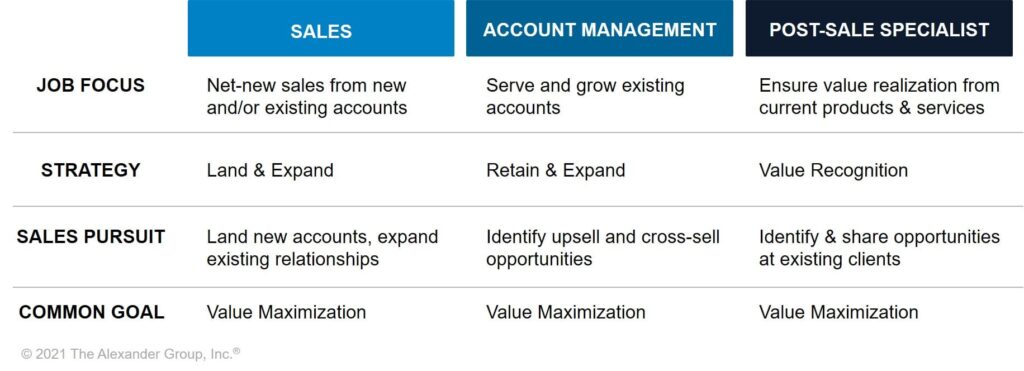Providing Value After the Sale

The evolution of the post-sale specialist
New customer expectations drive value delivery model
As subscription and consumption-based revenue models continue to rise in popularity, businesses are forced to leave behind legacy, cyclical sales cycles and develop commercial models that emphasize continual value delivery to customers. This is largely driven by customer’s new expectations: to receive ongoing service, education, support, and value throughout their contractual relationship.
New sales, service and support models are emerging, united by value and facilitated by technology.
Specialist roles reveal customer opportunities
Value is now at the heart of the customer relationship. Revenue leaders view this new relationship as both a responsibility and an opportunity. Leading companies now explore how to enhance Customer Lifetime Value (CLV), reduce customer churn and increase their competitive advantage within the framework of new revenue models like XaaS.
Companies must now invest in resources that provide a breadth of service and support options focused on delivering value to customers. In addition to new products, companies need people who continually engage with customers at different levels, supporting current products while opening doors to potential sales opportunities throughout the contract’s life.
Leading companies are training specialists to support existing products while opening doors to new opportunities. As customer-facing resources, they are being taught how to identify and share cross-selling and upselling opportunities that maximize value while increasing sales. Specialists support Sales and Marketing, contributing to use cases that highlight the value of current products, the potential use of products across multiple departments, or complementary products that maximize the value chain.
Post-sale Specialists provide value but are also the client-facing link that companies are leveraging to promote continuous engagement.
Specialist roles and responsibilities
Specialist roles are expanding as they become client-facing experts who support the sale throughout the customer relationship. These roles, and their related industry sectors, include:
- Customer Success Manager (Software)
- Client Consultant (Business Services)
- Customer Experience Manager (Business Services)
- Clinical Care Specialist (Medical)
- Customer Advocates (High-Tech)
Traditionally, organizations have focused their sales resources on closing deals, including net-new, upsell, and cross-sell, by offloading any renewal or customer support-related activities to lower-cost functions outside the sales organization. With the pandemic’s onset, organizations are finding new ways to leverage field sales, inside sales, customer success and support specialists to maximize their customer engagement.
Historically, specialist responsibilities focused on value realization, customer adoption, enhanced utilization, customer education and competitive threat migration. Today, as companies deploy a more robust digital presence, new specialist roles include content management, eCommerce, and social media roles that promote client engagement levels. These roles are not only responsible for generating qualified leads but nurturing customers throughout the relationship. Reducing customer churn is a high priority across all departments as companies seek to support clients during a volatile business environment.
Roles are evolving, but are centered on maximizing value
Leading companies now put value maximization at the center of their business model. Organizational hierarchies, sales compensation, and other business infrastructures evolve rapidly to provide value and grow revenue.
Field Sales still has primary responsibility for new growth, as they identify sales opportunities within client accounts and territories. Account Management roles search out net-new opportunities within existing accounts, focusing on sales first, maintenance second. The post-sales Specialist role focuses on providing service and maximizing customers’ value from existing products and services. For Specialists, sales opportunities are a secondary motive, usually in collaboration with Account Management and Sales.

Technology unites these roles. Firms invest in CRMs and digital tools that capture information from across the organization to grow existing accounts while identifying new opportunities. Since the customer now plays a central role for all Sales, Account Management, and post-sales Specialist activities, all departments must focus on maximizing value. The post-sales Specialist is typically the client-facing role that delivers that value, making them an essential resource to the customer and the entire company.
Discover how leading companies maximize customer value
How are leading firms dealing with continued changes to their revenue model? Post-sale specialists are just one way they add substantial value that adds to the customer experience. To learn how leaders are meeting the ongoing challenges of growing revenue while providing value, contact an Alexander Group Business Services practice lead today.